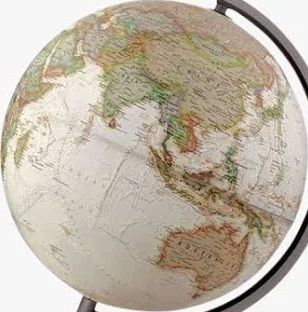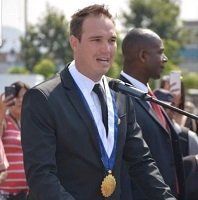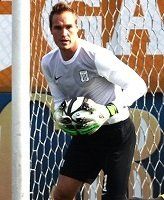I don't know if Leith's Alexander Ross Forsyth was a typically football-loving Scot. Born in 1879 his young years would have been as his country enjoyed its first Golden Age but then his youth would have been as it suffered its first slump so nothing is completely certain. But as a working-class laddie made better he might well have been and with that we can imagine that today a degree of great-grandfatherly pride on not just one but now two fronts. What we do know is that he was the fourth child and first son of millwright, Lawrence Forsyth, and Ann Ross, whose stay with him was to be short-lived. Neither of his parents were from the city. They were both from much further north. He had been born in Boyndie by Cullen in Banffshire and she in Rossheen, between Alness and Invergordon in Easter Ross. And within two years the family had moved to Leuchars in Fife, where the father was a mechanic in a paper factory, as he would be a decade later.
Then something seems to have happened. In 1901 Lawrence, now a retired engineer, is back in Old Reekie with his younger children but no Alex and Ann seems to have returned home. She is now a housekeeper on a farm back in Rossheen. And in 1904 at the age of fifty-nine Lawrence is dead probably followed in 1915 in Avoch by Ann. But by then Alex was long gone. In fact he had five offspring, Alejandro, Maria, Ana, Guillermo and Elena, was on his second marriage and had been living for at least a decade over six thousand miles away the reason being that at some point before 1905 he had travelled as a engineer to Peru, had married a Peruvian and they were expecting their first child.
And that might have been it. He had perhaps arrived in Lima, perhaps in 1900, since he does not appear to have been recorded in Scotland in census of 1901, probably on a four year contract, just as my grandfather was to do to Brazil twenty years later, and like them would never go back. And in Peru he had met not just a Peruvian, but a Scots Peruvian. Augusta Swain or Swayne, was the grand-daughter of Henry Wallace Swayne, who had been born in Dysart in Fife, had arrived in the first wave of Scots emigration to South America in the late 1820s or 1830s, Peru achieving independence from Spain in 1826, and too had married in Lima and stayed. He would die there in 1877.
However, marriage between the Scot and the Peruvian Scot did not work out. They were divorced seemingly with a second child on the way and in 1909 he very quickly remarried, he a Catholic, either new or existing is not clear but perhaps a reason for South American emigration, and was to have eight children with his second wife, Lucila. They can be seen travelling together to the United States in 1922 and she, a decade younger, would outlive him by thirty-odd years. He would die in Lima in 1949. She in 1982 just three years before their afore-mentioned son, William, Guillermo, the one to take the story further.
Guillermo Forsyth, Willy, was born still in Lima in 1912 and married late, in 1950, the year after his father's passing. His wife, Luciola Mejia was not young either, born in 1913 but they soon had a son, born in the small town of Huanta in the centre of the country and who they named Harold. He, Harold Forsyth, after university in Peru would join his country's diplomatic service, marry Maria Sommer, a former Miss Chile, be posted to Chile, Venezuela, Canada and Germany, in 1995 become a Congressman for five years, then re-join the Diplomatic Corps and in succession become Peruvian Ambassador to Colombia, served as Deputy Foreign Minister, headed the Embassies in Italy, China and the USA and is currently in post in Japan.
And it was whilst in Venezuela in 1982 that Harold and Maria would have a son, who they called George, who as a boy in Germany showed footballing promise, in 2001 back in Peru joined the century-old, now professional club, Alianza Lima but made no appearances and in 2002-3 returned to Germany to play six games for Borussia Dortmund's second team. Then back in Peru in the rest of 2003 he made twelve starts for Atletico Universidad, the league team from the southern city of Arequipe, returned to Alianza Lima for nine games the next season, played in 2005 for Sport Boys, the league team from Lima's port city, Callao, before returning to Alianza for forty-two appearances between then and 2007.
And it was in 2007 that George Forsyth was first called up to the Peruvian national team in a Copa America fixture that could only be described as "tricky". It was home to Argentina. Riquelme scored twice, Messi once and Mascherano once also without Peruvian response. Three more caps would follow the next year, all defeats, as would be a sole cap in 2009 but then Peru in that period would win only three encounters of twenty-three. And by then Forsyth would have spent a season at Atalanta in Italy, always on the bench, never as a starter, and returned to Peru to Alianza, where until retirement in November 2016 he feature in one hundred and seventy-three games and in 2014 five more caps including a 3-0 defeat against England at Wembley and finally three wins to sign off.
In 2014 George Forsyth was thirty-three years old, young for an ex-goalkeeper, and that might have been it. But in the meantime he had qualified as an engineer, gone into business and also into politics. In 2010 he had become a district councillor in a Lima suburb, in 2014 becoming its acting mayor and in 2018 taking on role in his own right. Since then also he stepped up onto the national scene and last month, October 2020, announced his intention to run for the Peruvian Presidency in the next election next year, 2021. Campaigning has already started and, whilst perhaps unlikely, it is far from impossible that we might see the great-grandson of a Scot, the great-great grandson of Moray Firth folk, as a head of state in the Americas. If it happens, let us pray that he proves for Peru's, indeed, for all our sake's, to be, as an ex-international goal-keeper, a safer pair of hands than the possibility's other, most recent and wretched example.


